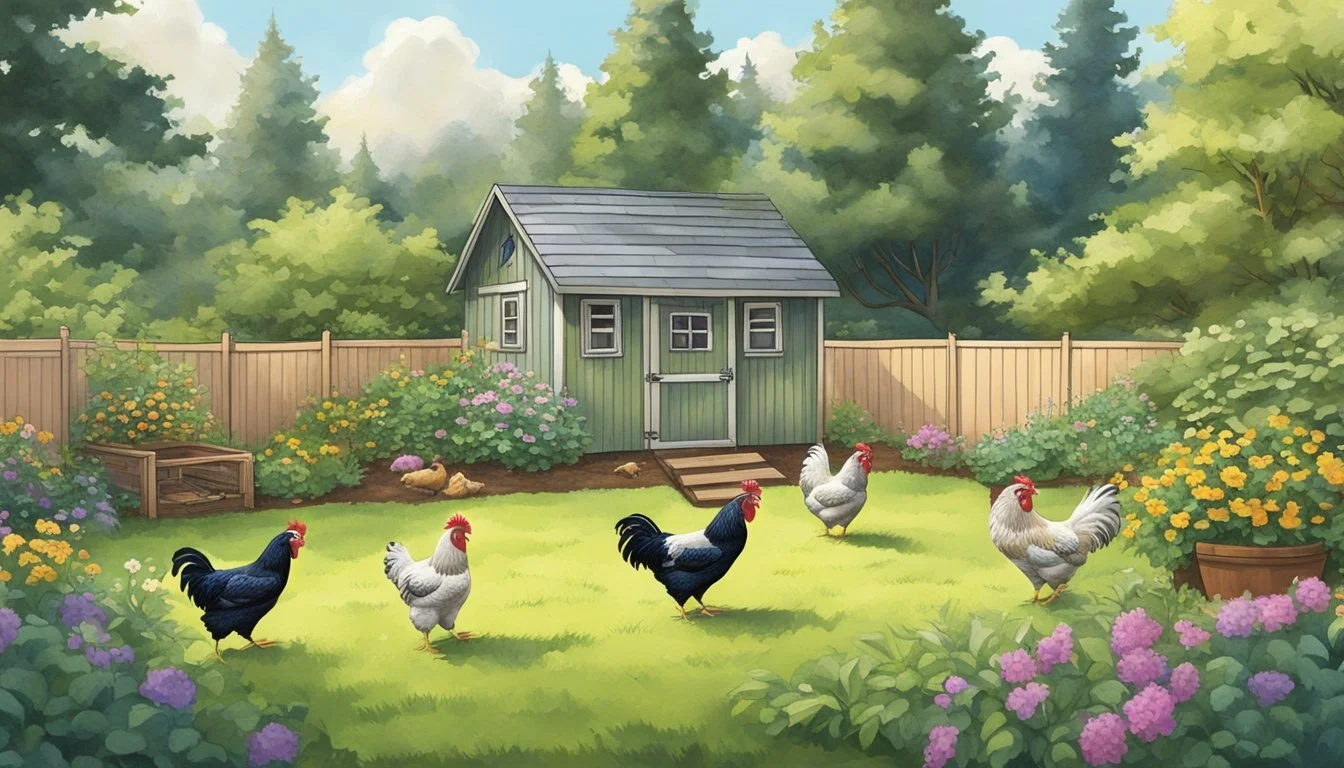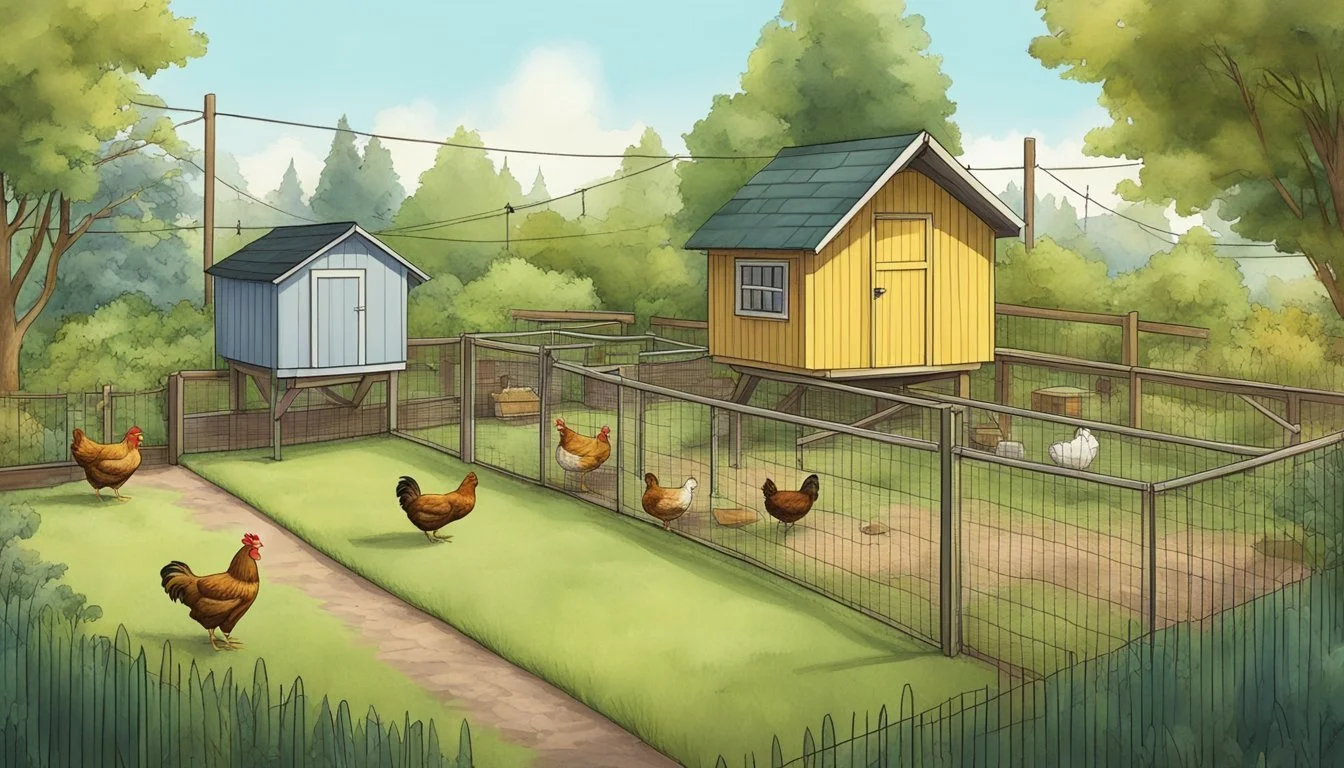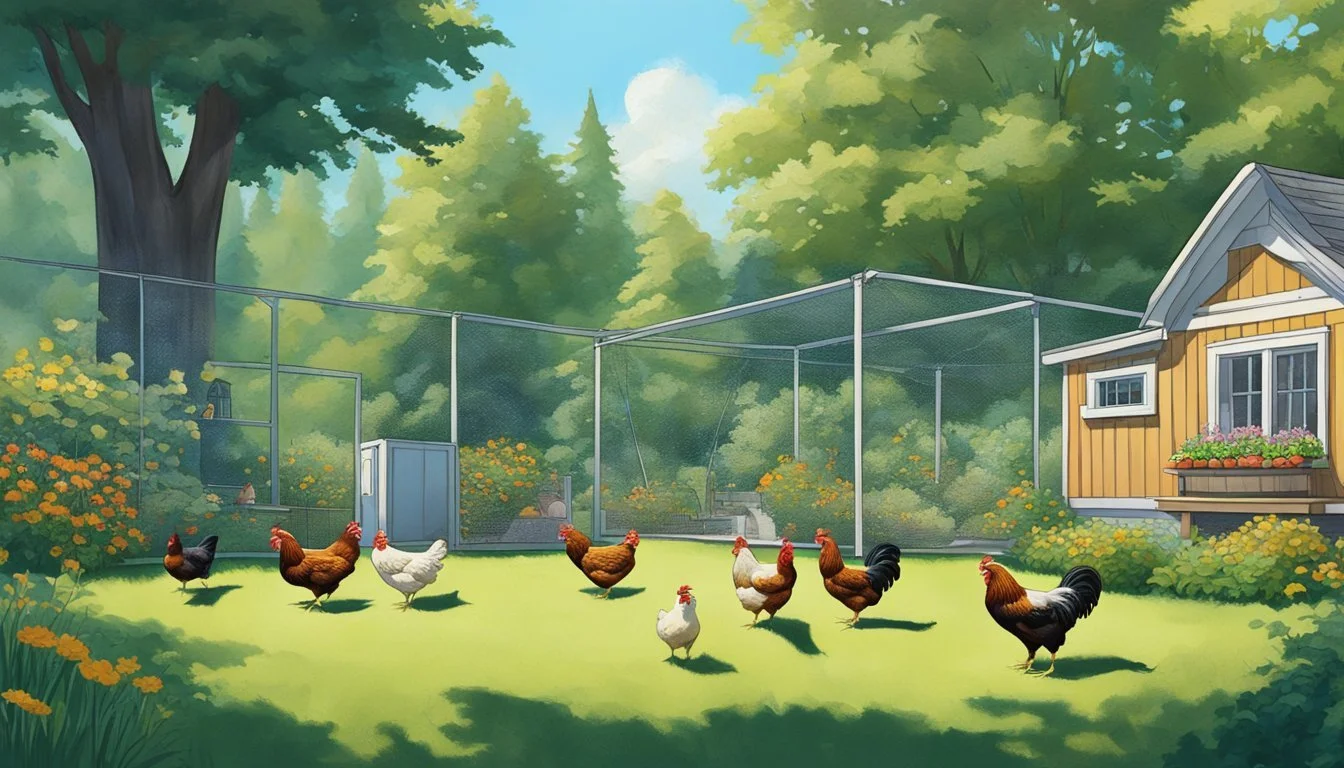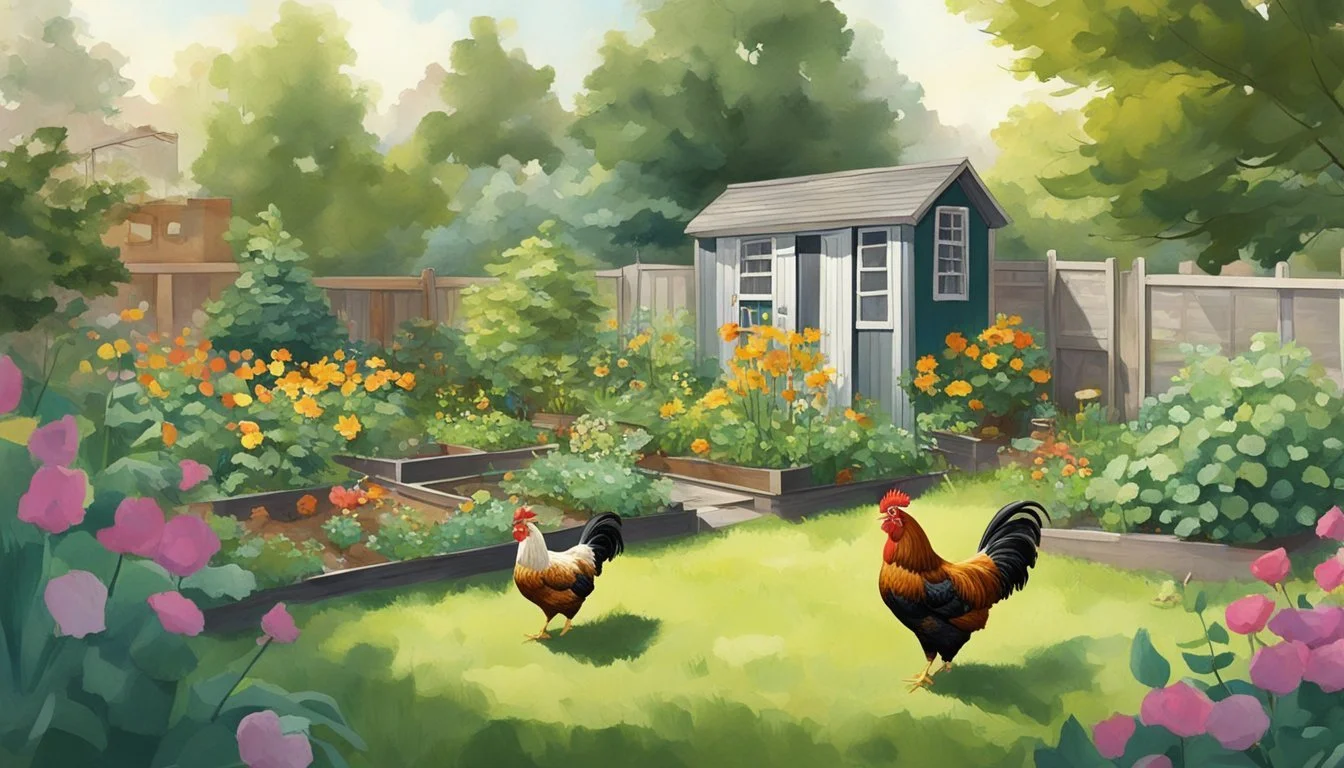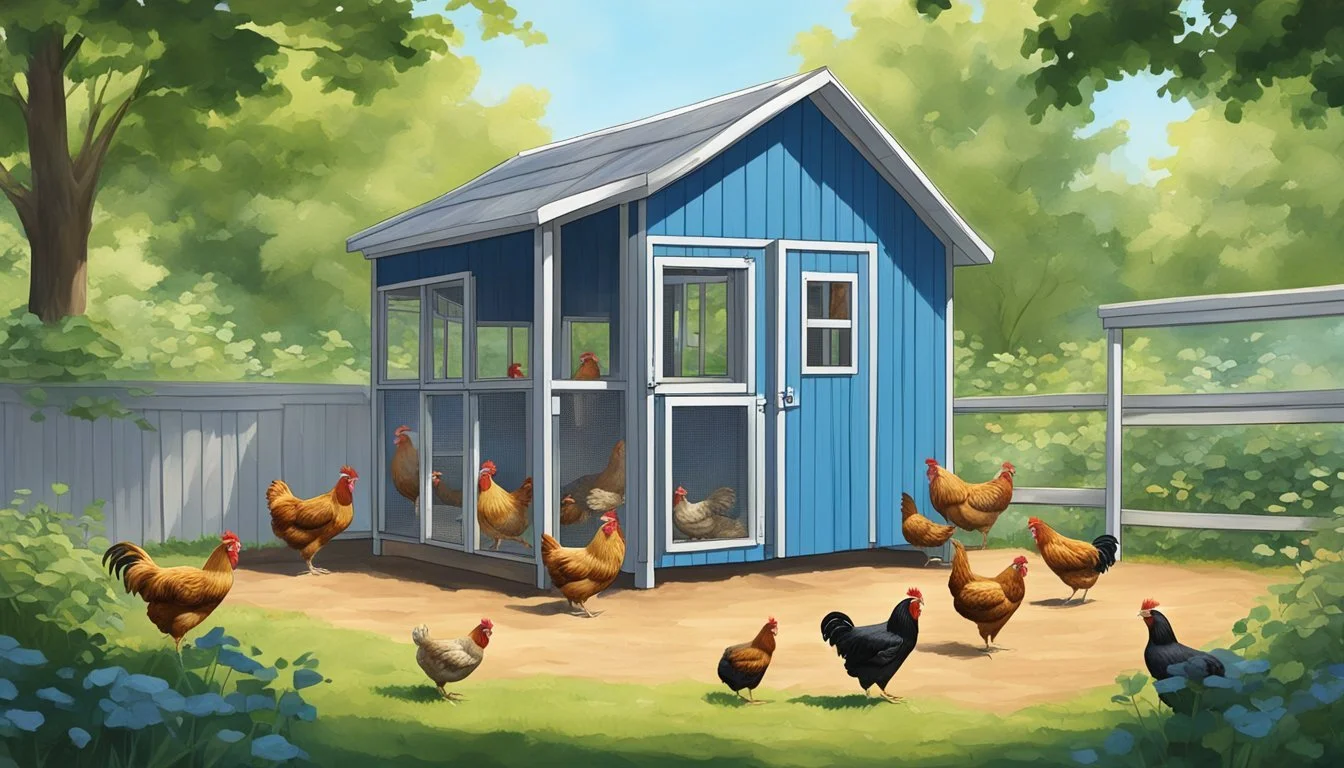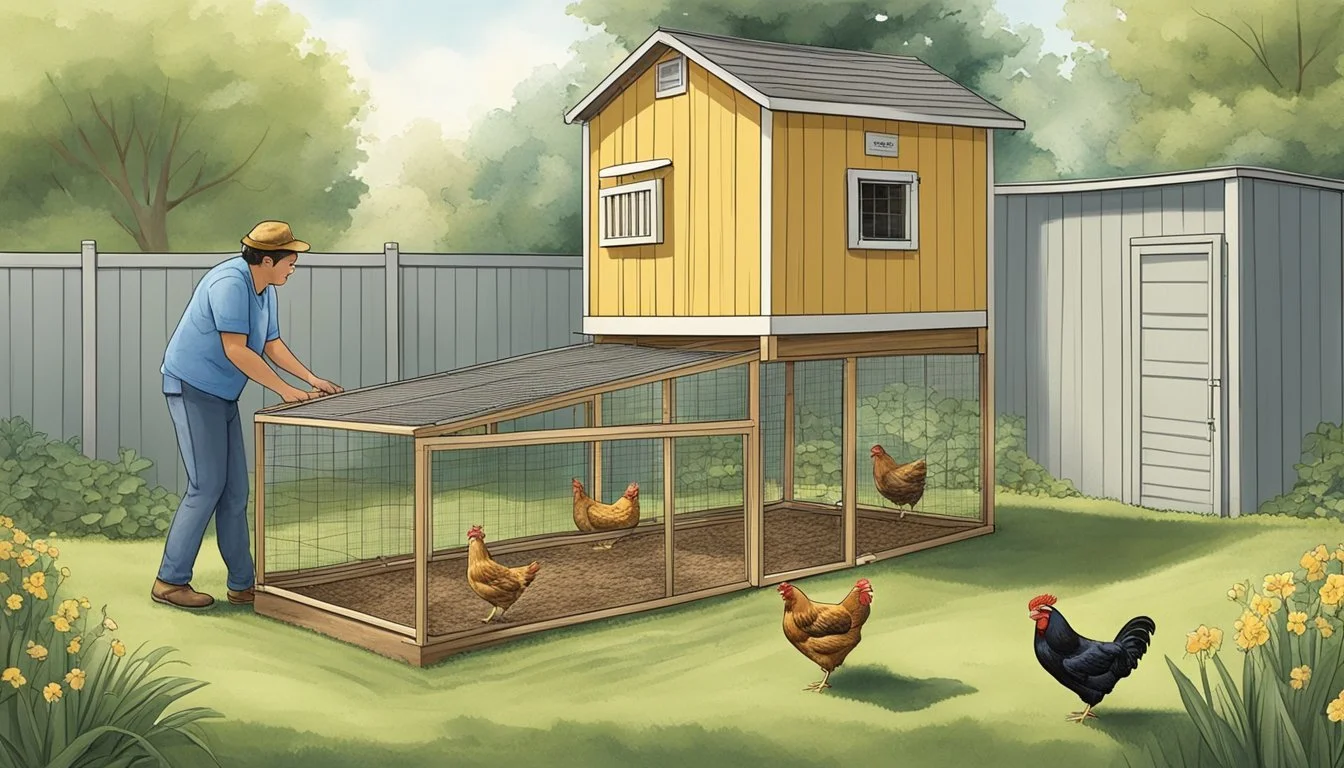Raising Backyard Chickens in Corvallis, OR
Essential Tips for Beginners
Raising backyard chickens has become an increasingly popular practice in Corvallis, Oregon, thanks in part to a growing interest in sustainable living and local food sourcing. The city's regulations are accommodating for residents who wish to keep chickens, allowing them to enjoy fresh eggs and the benefits of these feathered companions right in their own backyards. No explicit limit exists on the number of chickens a person can own as long as they remain on the owner's property, making it a flexible option for urban homesteaders.
However, it's important to note that while chickens are welcome in Corvallis, roosters often are not due to the potential for noise disturbances that could infringe upon local noise ordinances. For those considering introducing chickens to their Corvallis residence, it's essential to consult with local authorities to ensure compliance with all relevant regulations and to foster good neighborly relations.
Residents of Corvallis must stay informed about the most recent guidelines to successfully navigate the responsibilities that come with raising backyard chickens. This includes proper coop construction, maintaining cleanliness to keep the flock healthy, and managing waste. Understanding these local ordinances and best practices ensures that both the chickens and the community flourish.
Understanding Corvallis Chicken Ordinances
In Corvallis, Oregon, residents are allowed to raise chickens given that they adhere to city-specific ordinances, including obtaining permits, adhering to limits, and managing noise, particularly from roosters.
City Regulations and Limits
Corvallis does not set a specific limit on the number of chickens one can keep; however, it is imperative that all chickens remain on the owner's property. To ensure compliance with current standards and any potential changes, they should contact local authorities or consult City Recorder Alex Downing for assistance.
Permit Requirements
Residents of Corvallis are required to obtain a permit from the Animal Control Officer before keeping chickens. The process ensures that chicken coops meet the standards set for safety and cleanliness.
Noise and Roosters Ordinance
Although city ordinances do not explicitly mention roosters, they could potentially lead to violations of noise ordinances. Should a complaint be raised by neighbors due to noise, rooster owners might face regulatory action. It is generally advised to avoid keeping roosters to prevent conflicts with noise regulations.
Setting Up Your Chicken Coop
In Corvallis, OR, establishing a chicken coop requires careful consideration of the location, design, and protective measures to create a sustainable and safe environment for backyard chickens.
Choosing the Right Location
The ideal location for a backyard chicken coop in Corvallis should offer sufficient space and exposure to natural elements. One must ensure each chicken has 2-3 square feet inside the coop and 8-10 square feet outside for roaming. Accessibility to water, sunlight, and shade are critical, along with shelter from the wind. The local climate and weather patterns dictate where one might place their coop to provide the chickens with a comfortable habitat year-round.
Coop Design Principles
When designing a chicken coop, functionality meets sustainability. The coop should facilitate easy cleaning and maintenance while being durable to weather conditions. It's advisable to include features such as:
Adequate lighting
Roosts at varying levels
Nesting boxes (allow for one box per 3-4 hens)
Selecting suitable materials is crucial for the longevity and protection of the coop. Use hardware cloth for windows and run areas instead of chicken wire, as it provides better resistance to predators.
Predator-Proofing Essentials
Protecting backyard chickens from predators is imperative. In Corvallis, common threats include raccoons, foxes, and birds of prey. To safeguard the coop, effective strategies include:
Burying the hardware cloth around the coop perimeter at least 12 inches deep to deter digging predators.
Securing all openings with locks or latches as raccoons can open simple fastenings.
Reinforcing the coop's structure to prevent predators from breaking in.
Installing motion-activated lights or noises can also deter nocturnal predators.
Selecting Your Chickens
When starting a backyard flock in Corvallis, OR, future chicken owners should consider the climate of the region, the age of the birds they want to start with, and the natural behaviors of different chicken breeds to ensure a successful and harmonious backyard coop.
Best Breeds for Corvallis Climates
In Corvallis, the moderate climate with wet winters and dry summers suggests selecting chicken breeds that adapt well to changeable conditions. A few recommended breeds include:
Plymouth Rock: Hardy in various climates and an excellent layer.
Rhode Island Red: Known for being robust and laying eggs consistently.
Sussex: Versatile for both meat and egg production, with good cold tolerance.
Hatching Chicks vs. Buying Adults
Chicken enthusiasts have the choice between hatching chicks or purchasing adult birds. Here are considerations for each:
Hatching Chicks: Provides a full experience of the chicken lifecycle, allowing for bonding and raising them as pets; however, it requires more equipment, such as an incubator, and a longer period before egg production starts.
Buying Adults: Offers a quicker start to egg-laying and bypasses the fragile chick stage, but limits the bonding experience and may require a quarantine period to prevent disease spread to existing flocks.
Understanding Chicken Behavior
Chickens exhibit a range of behaviors that are important to understand for successful backyard flock management. A few to note include:
Chickens establish a pecking order; stress can be minimized by maintaining a stable group.
They require entertainment and space to forage to prevent destructive behaviors.
Recognizing normal vs. abnormal behavior can be crucial in early disease detection.
Chicken Care and Management
Raising chickens in Corvallis requires understanding their dietary needs, ensuring a consistent water supply, preventing disease, and maintaining a clean environment to ensure the health and productivity of the flock.
Feeding and Nutrition
Chickens need a balanced diet rich in nutrients to thrive and produce quality eggs. Layer feed is essential as it's formulated with the correct balance of proteins, vitamins, and minerals, including calcium which is critical for strong eggshells. Offer a mix of appropriate feed for the chickens' life stages—starter, grower, and layer feeds. Additionally, supplementing with oyster shell can boost calcium intake, and grit helps them digest their food.
Starter Feed: High in protein to support growth (typically medicated to prevent Coccidiosis)
Layer Feed: Lower in protein but enhanced with calcium and other nutrients
Supplements: Oyster Shell and Grit for proper digestion and eggshell quality
Watering Systems and Hydration
Chickens must always have access to clean, fresh water. A reliable waterer prevents spillage and contamination, and should be cleaned regularly to deter algae growth and the spread of disease. In winter, a heated water system may be necessary to prevent freezing.
Daily Water Check: Refill and clean waterers daily
Waterer Maintenance: Regularly check for leaks and blockages
Health Monitoring and Disease Prevention
Regular health check-ups can catch early signs of illness. Look for changes in behavior or appearance that might indicate disease. Vaccinations and medicated feed can be proactive measures against common illnesses like Coccidiosis. Restrict access to wild birds, maintain a clean coop, and establish a quarantine protocol for new arrivals.
Observation: Daily monitoring of chicken behavior and appearance
Cleanliness: Keep the coop and run free from droppings and spoiled feed
Cleaning and Maintenance Routines
A clean coop reduces disease risk and keeps chickens healthy and productive. Remove droppings daily and perform a deep clean at least once a month. The chicken run should be spacious and secure, with routine checks for potential hazards.
Daily: Remove feces and leftover food
Monthly: Clean the coop thoroughly, replace bedding, and check for coop integrity
Egg Production and Usage
In Corvallis, OR, residents engaging in backyard chicken-keeping must factor in various elements to maximize egg production and understand the nuances of collecting, storing, and selling eggs. This involves adhering to local guidelines and best practices that ensure the well-being of the chickens and the quality of the produce.
Maximizing Egg Production
The key to successful egg production lies in providing optimal living conditions for the chickens. This includes ensuring a balanced diet, proper coop construction, and maintaining a consistent light schedule. Chickens require adequate space, and it is recommended to allow at least four square feet per hen in the coop. Additionally, diet influences not only the health of the hens but also the quantity and quality of eggs produced. A diet high in protein is essential, particularly during the laying period. Laying mash or pellets are formulated to meet these dietary requirements.
It is important to note that egg laying is tied to the number of daylight hours, so supplemental lighting might be needed during shorter days to maintain egg production. Hens typically produce eggs most efficiently in their first year, with production naturally decreasing in subsequent years.
Collecting and Storing Eggs
Fresh eggs need to be collected frequently to maintain their cleanliness and quality. Ideally, eggs should be collected at least once a day. After collection, eggs should be stored properly to extend their shelf-life. Storing eggs at a consistent and cool temperature is critical, and they can be kept in a refrigerator for several weeks.
Storage Tips:
Temperature: Keep eggs between 35-40°F (1.7-4.4°C).
Position: Store with the pointed end down to maintain egg quality.
Hygiene: Clean any dirt or feces off eggs, but avoid washing to preserve the protective bloom.
Selling Eggs Legally
Residents of Corvallis looking to sell eggs must comply with local health and safety regulations to ensure public safety. Individuals should obtain the necessary permits and adhere to labeling requirements. The Oregon Department of Agriculture provides specific guidelines for small-scale egg sellers, which include but are not limited to, washing and candling eggs, as well as proper egg carton labeling that states the name and address of the producer.
Required Labeling Information:
Name and address of the producer
Grade and size of the egg (if graded)
Safe handling instructions
Date of pack or sell-by date
Sellers should remain informed about local ordinances, such as zoning laws and any limits on the number of chickens allowed, which can impact the scale of egg selling operations. It is important to note that egg sales should ensure food safety and transparency to the consumer.
Integrating Chickens into Urban Backyards
Integrating chickens into urban backyards in Corvallis, OR, involves understanding the social structure of the flock, recognizing chickens as both pets and community members, and navigating the city's legal framework for backyard poultry.
Social Dynamics and the Flock
Introducing chickens to a Corvallis backyard requires careful consideration of flock dynamics. Chickens establish a pecking order that maintains social structure within the group. When adding new birds, owners should:
Quarantine new chickens: For at least 30 days to monitor health.
Gradual introduction: Place newcomers in a separate but visible enclosure to let them see and hear each other without physical contact, reducing initial aggression.
Chickens as Pets and Community Members
In Corvallis, backyard chickens are often considered both pets and contributors to local sustainability efforts. They provide:
Eggs: A fresh, sustainable food source.
Companionship: Like other pets, chickens have distinct personalities and can bond with their owners.
Education: They offer learning opportunities about animal care and food sources.
Owners should ensure:
Proper care: Adequate shelter, food, water, and protection from predators.
Community interaction: Facilitate positive experiences for neighbors and visitors with chickens to foster a community-friendly environment.
Legal Aspects of Backyard Chicken Rearing
The City of Corvallis has specific ordinances regarding the raising of backyard chickens to ensure the well-being of the chickens, owners, and the community. Key points include:
Number of Chickens: A maximum of five hens is allowed; roosters are prohibited to prevent noise issues.
Housing requirements: Coops and runs must meet certain size and setback requirements from property lines and neighboring dwellings.
Permits: Residents must obtain a permit and adhere to city regulations regarding the upkeep and management of their chickens.
Compliance with these ordinances is essential for the responsible integration of chickens into urban settings.
Community Engagement and Resources
Involvement with the local community and availability of accurate resources is crucial for those interested in raising backyard chickens in Corvallis, Oregon.
Connecting with Local Chicken Enthusiasts
Individuals looking to raise chickens in Corvallis can find a supportive community by attending local events such as "Cooped Up in Corvallis," an annual tour showcasing creative chicken and duck coops. This event is an excellent opportunity to meet experienced backyard chicken keepers and gain insights into best practices for poultry housing and care.
Oregon State University Extension Service
The Oregon State University (OSU) Extension Service is an invaluable resource for residents. They provide research-based information and offer workshops on various topics, including poultry raising. As part of their mission, the Extension Service can assist with understanding local regulations and provide guidance on chicken care.
Workshops Provided:
Chicken care basics
Disease prevention in poultry
Understanding local zoning laws for livestock
Online Forums and Mobile Apps
Forums specifically tailored to raising chickens provide platforms for discussion and a way to connect with a broader community. Here, individuals can join threads on forums dedicated to the topic, gaining knowledge and sharing experiences. Furthermore, mobile apps for iOS and other platforms offer tools for managing a flock and can connect residents with the broader chicken raising community.
Popular Forums and Apps:
BackYardChickens.com: A well-known forum with extensive threads on chicken care
Poultry Pal: An app designed to track flock health and egg production
Residents can utilize these resources to ensure a successful and compliant backyard chicken experience in Corvallis, integrating with both local enthusiasts and the wider online community.
Additional Considerations
Before delving into the specifics of raising backyard chickens in Corvallis, OR, careful attention should be given to seasonal care requirements, waste management practices, and local ordinances affecting zoning and property values. These facets are pivotal in maintaining a healthy environment for chickens and ensuring compliance with relevant regulations.
Seasonal Care for Winter and Summer
Winter:
Shelter: Insulate the coop to shield chickens from the cold, ensuring a balance between warmth and adequate ventilation to prevent moisture buildup.
Roosts: Elevate roosts to keep birds off the cold ground. Chickens will huddle together for warmth.
Summer:
Provide plenty of water and shade to prevent overheating.
Implement dust baths to help chickens stay cool and mitigate parasites.
Managing Waste and Mitigating Odors
Muck Out: Regularly clean the coop and run to prevent ammonia build-up and keep odors at bay; ideally, waste should be mucked out weekly.
Compost chicken manure properly to use as garden fertilizer, ensuring it does not offend neighbors with strong smells.
Zoning and Property Value Considerations
Property Value: Maintaining a clean and orderly chicken space can prevent potential negative impacts on property value.
Zoning Laws: Stay informed on Corvallis zoning laws regarding chicken keeping; reach out to local officials to ensure compliance and avoid penalties.
Getting Started
The initial steps in raising backyard chickens in Corvallis, OR, should be approached with attentiveness and foresight, particularly focusing on ensuring a robust preparation, sourcing from dependable providers, and setting realistic anticipations for those new to the practice.
Preparation Checklist for Beginners
Research Local Ordinances: Corvallis permits residents to keep chickens without specifying a limit; however, always verify current regulations with local authorities.
Obtain Necessary Permits: A permit from the Animal Control Officer is required to legally keep chickens.
Coop Design: Design a chicken coop that provides ample space, protection from predators, and a clean environment to maintain the health and safety of the poultry. Beginners should look for simple yet efficient designs.
Secure Feed and Water Supplies: Ensure consistent access to high-quality chicken feed, which can cost approximately $20 per 50-pound bag, and establish a daily water supply system.
Finding a Reputable Hatchery or Farm Store
When selecting a source for your chickens, diligence is key. Choose either a reputable hatchery or a local farm store that is known for robust animal health practices and provides a variety of breeds suitable for the Corvallis climate. Quality breed selection is essential for successful chicken keeping.
Setting Expectations for First-Time Owners
Beginners should understand that hens lay eggs predominantly through spring, summer, and into fall, provided they have 12 to 14 hours of daylight. Feed consumption rates vary depending on the number of chickens; someone starting with a modest flock should expect a 50-pound bag of feed to last longer than a larger flock. Regular maintenance, including daily feeding and coop cleaning, is critical.
Troubleshooting Common Issues
When raising backyard chickens in Corvallis, OR, owners may encounter various challenges such as aggressive behavior, illness, death, and parasites. A proactive approach to these common issues can ensure the flock's well-being and productivity.
Addressing Aggressive Behavior
Chickens may exhibit aggression due to stress, pecking order disputes, or overcrowding. To mitigate this behavior, ensure that the coop is spacious and that there is at least one chicken tractor available for the flock to forage and exercise in a controlled environment. This mobility helps reduce stress and aggressive tendencies.
Handling Illness and Death
Illness and death are unfortunate aspects of raising chickens. Regular observation helps in early detection of health problems. Symptoms such as lethargy, abnormal droppings, or respiratory distress call for isolation and veterinary consultation. It is crucial to maintain a clean coop environment to reduce the spread of bacteria and monitor for Salmonella, a common bacterial infection that can lead to severe illness or death.
Preventing and Treating Parasites and Bacteria
Parasites and bacteria pose significant health risks to backyard flocks. Establishing a routine to check for parasites and implementing biosecurity measures are essential. Here's a list of practices to prevent and treat common issues:
Sanitation: Regularly clean and disinfect the coop and equipment.
Quarantine: New birds should be quarantined for at least 30 days before joining the flock.
Prophylactic Treatments: Use approved anti-parasitic medications and maintain up-to-date vaccinations.
Observation: Remain vigilant for signs of parasites, such as decreased appetite or feather damage.
Through consistent care and management, many of the challenges encountered when keeping chickens can be effectively addressed.
Engaging with Authorities and Community
Engaging with authorities and the community is essential when raising backyard chickens in Corvallis, OR. Residents should be well-informed about local ordinances, participate in civic activities, and contribute constructively to sustainability efforts.
Navigating Neighborhood Disputes
Disputes may arise when raising chickens in a residential area. To preemptively address potential issues, it is advisable for residents to:
Communicate with Neighbors: Share plans to raise chickens, highlight efforts to minimize noise and maintain cleanliness.
Understand Local Ordinances: Ensure compliance with any restrictions on the number of chickens and coop placement to avoid neighbor complaints.
Participating in City Council Meetings
City council meetings are an opportunity to engage with local authorities. They provide a platform for residents to:
Voice Concerns or Support: Residents can express their opinions regarding urban agriculture and its regulations.
Stay Informed: By attending, residents keep abreast of any potential changes to chicken-related ordinances.
Contributing to Local Sustainability Initiatives
Backyard chickens can be part of larger sustainability efforts within Corvallis. Residents can contribute by:
Supporting Local Food Sources: Raising chickens supports local food production, reducing the carbon footprint associated with food transport.
Educating Neighbors: Sharing knowledge about the benefits of raising chickens can encourage community involvement in sustainability initiatives.

